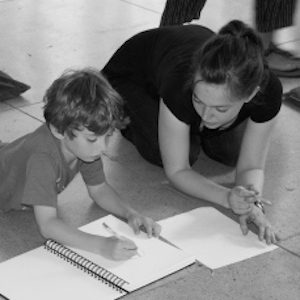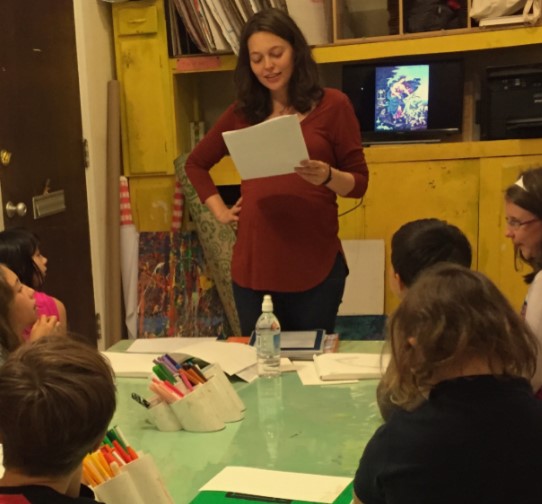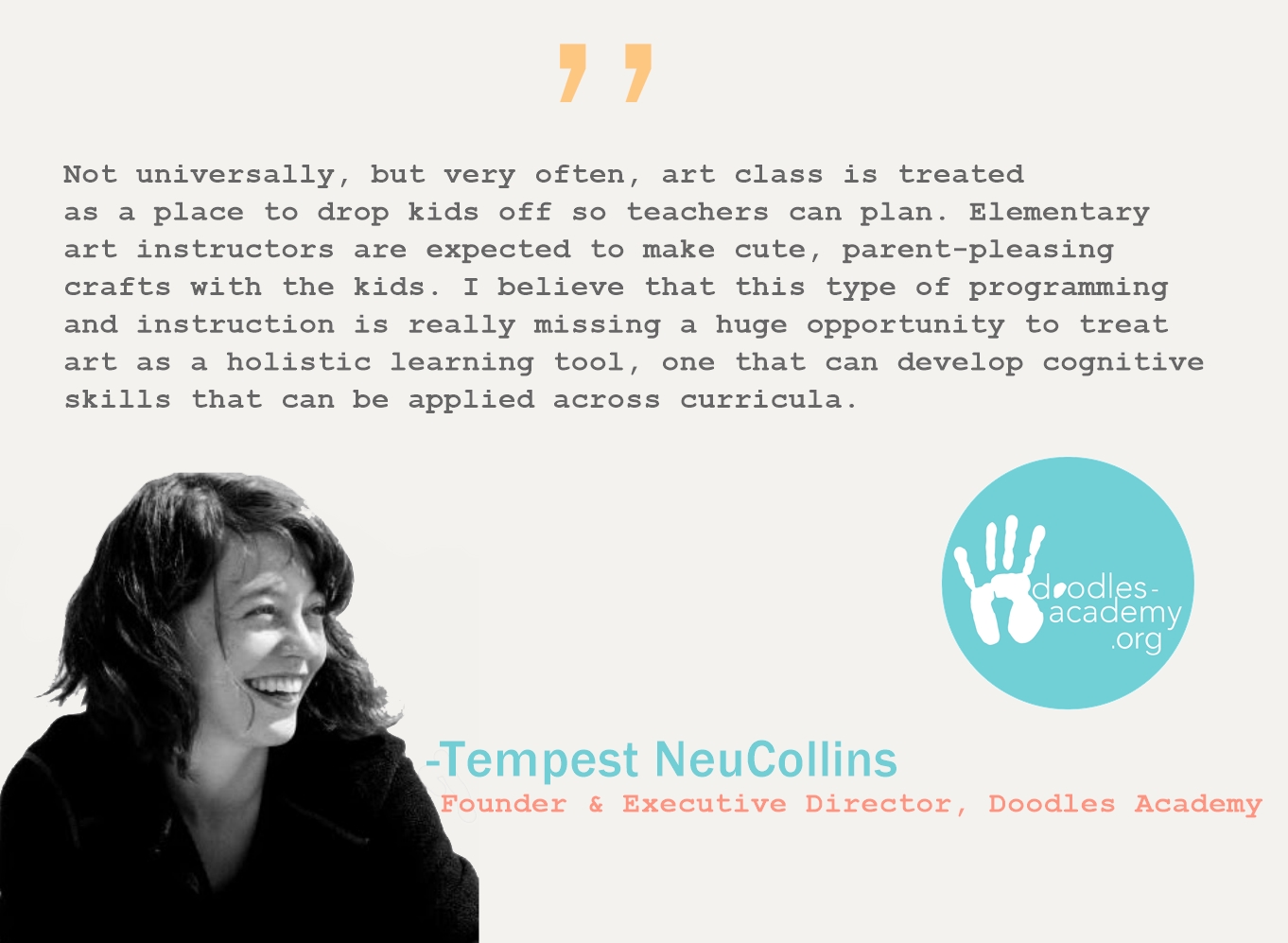Today we are chatting with Tempest NeuCollins, founder of Doodles Academy. Launched in 2015, Doodles is a nonprofit dedicated to providing free or low-cost art curriculum for elementary school students across the country, available online. Doodles helps elementary teachers, whether classroom teachers or art teachers, present their students with a relevant and responsive art curriculum. In addition to the online curriculum, Doodles also helps organizations update and improve their existing art curriculum or integrate art into other areas of study. We are excited to learn more about Tempest's journey in nonprofit leadership!
Thanks for joining us, Tempest! To get started, tell us about life before Doodles Academy. Did you always know you would pursue a career in arts education?
I actually have a masters in studio art, not art education. While I was in school I was really focused on creating my own work. But before, during, and after I was in school I was also working as a teaching artist to support myself. I don’t think I necessarily considered what I would do as a ‘career’ until after I graduated. But then I had to ask myself if I wanted to try to make a living as an independent artist, or support my art through doing something else. For many reasons, I chose the latter, and I took a job as a K-5 art educator at a charter school about a year after my graduation.
Tell us about the inspiration for Doodles Academy.
When I was working as a teaching artist, I worked in many different settings, and became increasingly aware of the huge disparity in access to art education. Even within schools that do have an art program, there was/is a gap in quality art education. Not universally, but very often, art class is treated as a place to drop kids off so teachers can plan. Elementary art instructors are expected to make cute, parent-pleasing crafts with the kids. I believe this type of programming and instruction is really missing a huge opportunity to treat art as a holistic learning tool, one that can develop cognitive skills that can be applied across curricula.

Additionally, when I worked as a K-5 art teacher, I worked in a school that served a pretty low-income area. I found that when I used my projects as an opportunity to approach conversations and topics that mattered to my students, I saw a lot more engagement.
This was the experience and the philosophy that guided me in founding Doodles Academy.
Can you share a quick story or anecdote that exemplifies the spirit and mission of Doodles Academy? Something that made you say, “this is why I do this work!“
These are not my words, nor is is ‘quick,’ but this letter from a teacher embodies why I do this work:
“When my fourth grade team was first presented with the Doodles curriculum I remember thinking “Yeah, that sounds great, in a perfect world where we have all the time we need.” It always seems like there’s not enough time to do what we NEED to do (academics), much less the “extra” things like art. I always feel behind and that makes it really hard to carve out time for activities that fall outside of the assigned ELA and math scope and sequences.
But we committed, because it felt like the right thing to do, and we carved out the time for our first Doodles unit back in October. As I watched the kids engage with the Doodles work it was great to see everyone interact with it in a different way. Kids who aren’t very invested in the day-to-day of our ELA curriculum became much more invested in getting their work done during our Doodles time. Kids who don’t usually get to shine got a chance to shine. It was a happy time.
This was of course great to see for the kids, but it was also great for me as a teacher. It helped to reinforce the thing I think a lot of us know to be true- that things we often relegate to the category of “extras” aren’t ACTUALLY “extras.” As good teachers we KNOW that art, music, play, conversation, etc. are all a part of excellent teaching, but they end up falling by the wayside as our well-intentioned efforts to catch our kids up academically become bad habits.
So my biggest reflection at the end of our two Doodles units was that making the time for art and creativity was totally worth it. It didn’t take the place of learning, it WAS learning, not only because it reinforced ideas and topics from our ELA curriculum, but because it helped kids experience thinking and problem solving in a way that is learning in and of itself. 100% would do again!”
-Phoebe Quin, Phoebe Quin, 4th Grade Classroom Teacher, Brooklyn, NY
I am sure the launch of Doodles has not been perfectly smooth. Every successful business or nonprofit has difficult days. What are some of the obstacles that you overcame, and what was your mantra during those tough moments?
We’ve consistently put out a great product, and consistently received great feedback. We know we are helping educators. I think these things, and a very firm belief in what we are doing, come together to form some sort of “mantra.”
We are still very much developing as an organization. We have done our work without a major backer to support salaries, operational costs, etc. This is actually really cool, as it means that everyone is contributing because they believe so firmly in the work we are doing. And, we’ve been able to be really flexible as we develop our organization’s identity. We support ourselves through individual donations, which is also empowering. However, it definitely does not extend to salaries, which, if we are going to be successful long-term, is a looming complication. And we’re working on it!
A few years back, a distributor was interested in financially supporting us, but they had some turmoil within their organization and it was placed on hold. Their support came with a number of strings attached, so while it was disappointing, I also can’t help but see it as a blessing. We were able to remain super flexible and autonomous. We would not be the same organization if we had partnered exclusively with them, and I love and am proud of the organization we are right now.
As a member of the Doodles Academy Board of Directors, I have been consistently surprised and impressed by your willingness to give up control and create a truly collaborative culture. Where did this approach to leadership come from, and why do you think this style is important for an organization like Doodles? On a related note, since Doodles is such a personal undertaking, does it ever make you nervous to give up control?
First, it makes me really happy to hear you say that. This has been really important to me since the inception. It stems from the fact that I had an idea that I thought could make a difference, but I knew I didn’t have the knowledge or expertise to do it on my own. I founded Doodles as a nonprofit because I knew that my vision was not enough — it was actually the collective vision that was important.
If we are hoping to help students across the country (and the world), understanding many viewpoints and life experiences is foundational to our success. By founding it as a nonprofit, I effectively gave up ownership. In our meetings and decisions I want to honor that co-ownership by giving my opinion, but ceding power.
Right now I’m thankful that you all see me as the leader of the organization, but you could vote me out at any point if I was no longer effective. Is that hard? Yes. But I also really believe in what we are doing and trust you all to pursue our mission. That overrules my ego.
What do you hope Doodles Academy will look like in five years and what is the next hurdle you need to get over to take Doodles to the next level?
We’ve spent a lot of time finding ourselves, but I think we are there now. Within the next 5 years, I hope we can move to a more sustainable model that supports the salaries of 2-3 full time employees. The hurdle within this is balancing our mission and goals with financial outcomes.
I have seen first-hand how hardworking and thoughtful you are, but everyone needs support from time to time. Who have you leaned on for help with this ambitious project?
Everyone on the board. I’m constantly in awe of the significant time and energy that is given in support of this project. But, very specifically, I want to highlight Carey Swanson and Cathy Price.
Carey Swanson is effectively a co-founder. She’s been with us from the beginning and has had a HUGE hand in shaping the direction that we’ve taken, particularly around art integration. We would be an entirely different organization without her hand helping to guide us.
Cathy Price is our board chair, and has been a rock for me. She listens to and helps direct my ideas and energy. Her style is a great complement to mine. She checks me, but also supports me, and consistently demonstrates a true belief in our mission.
If someone wants to support Doodles Academy and contribute to the mission, how can they help?
You can learn more about us at https://doodles-academy.org. We also accept donations here: https://doodles-academy.org/donations/
Public Good Talent is a boutique recruitment firm serving nonprofits and small businesses who are working to improve their communities. Based in Denver, Colorado, PGT serves organizations across the country.


Comments are closed.